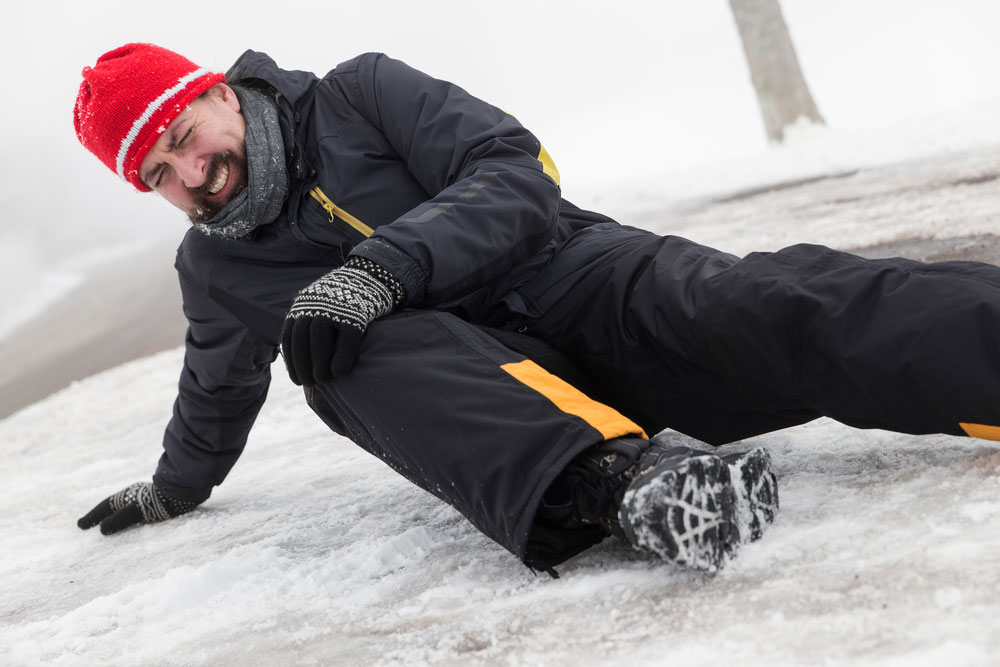
Proving Fault in a Slip and Fall Accident
Many people are injured each year from slipping and falling on a wet floor, defective stairs, or a rough patch of ground or other dangerous surfaces. The property owner may or may not be responsible for the accident. If you are planning to pursue an insurance settlement or personal injury lawsuit, you will need to prove that the property owner is liable for your injuries. There is no precise way to prove fault in a slip and fall accident. Generally, slip and fall cases are determined by whether the property owner acted carefully so that the accident would not have happened, or whether you were careless in failing to see the object you fell on.
Here are guidelines to determine whether the property
owner is liable for your slip and fall injury:
Determining Liability
For the property owner to be legally responsible for your slip and fall injuries, the following must be true:
-
The property owner or an employee caused the dangerous condition such as a spill, worn or torn spot, or other slippery items.
-
The property owner or an employee knew about the dangerous surface, but did nothing about it.
-
The property owner or an employee should have known of the dangerous condition and removed or repaired it -as a “reasonable” person would have done.
Determining A Property Owner’s “Reasonableness”
In determining a property owner’s “reasonableness,” the law focuses on whether regular and thorough efforts are made to keep the property safe and clean. In order to assess if the property owner was in negligence, here some questions to ask:
-
If you slipped or fell from a torn, broken, or bulging area of carpet, floor, or ground, or slipped on a wet or loose area, had the dangerous spot been visible long enough for the property owner to have noticed it?
-
Does the property owner perform regular cleaning, maintenance and inspection on the premises? If so, does the property owner have the proof?
-
Was there a legitimate reason for the object you slipped or fell over to be there?
-
If the reason no longer exists for the object to be there, could the area have been made safer if the object had been removed or covered?
-
Was there a safer place or a safer manner the object could have been located without causing inconvenience or expense to the property owner?
-
Would a barrier or a warning sign around the dangerous area have prevented the slip and fall accident?
-
Was the accident contributed by poor or broken lighting?
You may have a strong case, if the answers to these questions are in your favor. However, you must also consider if your own carelessness contributed to the accident in any significant way.
Proving You Didn’t “Cause” or “Contribute” to the Accident
In a slip and fall case, you must establish whether your carelessness caused or contributed to the accident. The “comparative negligence” rule helps measure your own “reasonableness” before the accident happened. The following questions can help to assess your own conduct:
-
Was there a legitimate reason for you to be in the premises where the accident happened?
Should the owner of the premises have anticipated you, or someone else in a similar situation?
Would a careful person in the same situation have noticed the dangerous condition and avoided it? -
Were there warnings indicating the dangerous spot?
-
Did anything distract you from paying attention to where you were going?
Injured in a Slip and Fall Accident?
Contact the Robert P. Ianelli Law Firm
1-877-IANELLI • 845-896-4711
If you or a loved one has been injured in a slip and fall accident in Orange County, contact knowledgeable slip and fall attorneys at the Robert Ianelli Law Firm. We will examine your case and help you to obtain the compensation you deserve for your injuries. Please contact us as soon as possible so that the fact gathering and investigation of claims can be quickly undertaken.
Nota: La información El contenido de este documento tiene solo fines informativos y no debe considerarse asesoramiento legal.
Solo su abogado puede darle asesoría legal. Si tiene una pregunta legal, debe consultar a un abogado con experiencia en lesiones lo antes posible.
© 2019 Robert P. Ianelli | Todos los derechos reservados | Abogado publicitario. Los resultados anteriores no garantizan un resultado similar.
